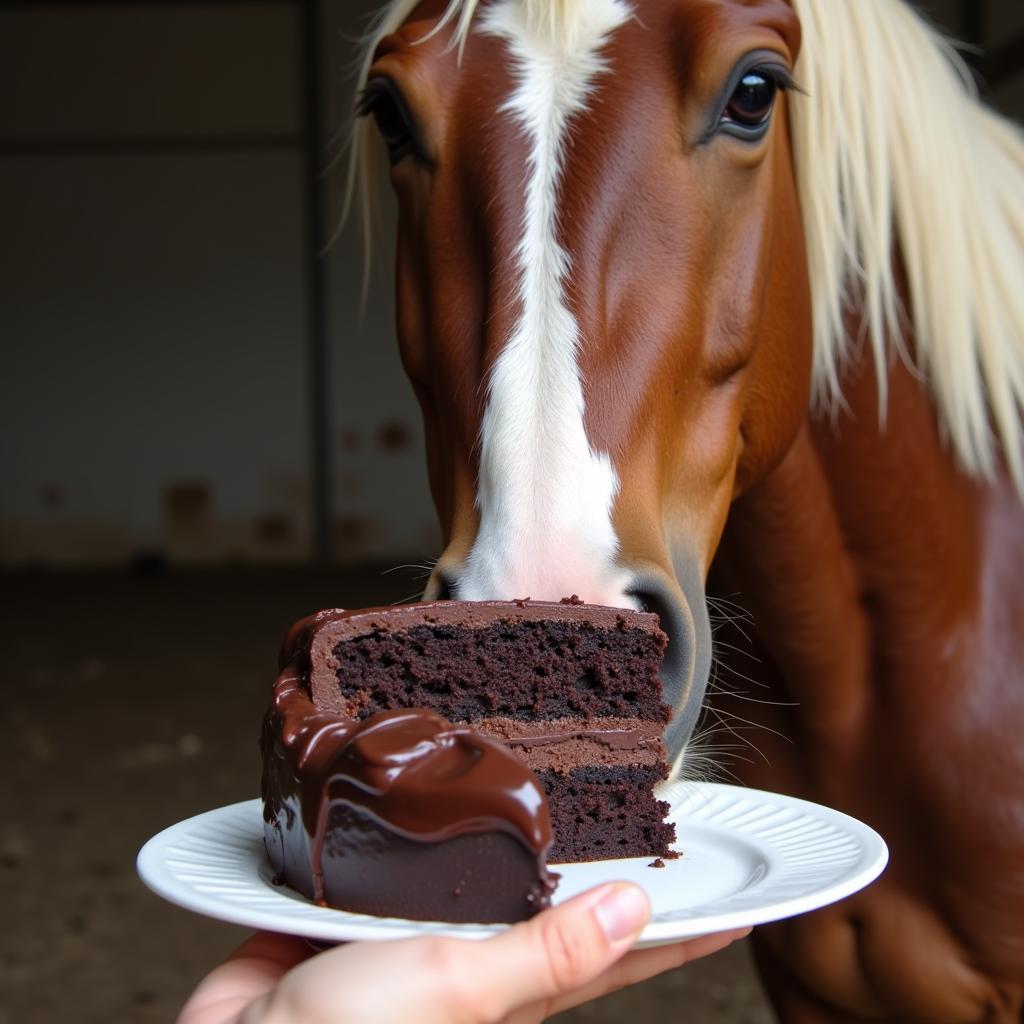We all know the joy a sweet treat can bring, but can you share your chocolate bar with your equine friend? The simple answer is no, horses should never eat chocolate. While seemingly harmless to us, chocolate can be toxic to horses, even in small quantities. This article will delve into the reasons behind this, the dangers involved, and provide you with safe and healthy alternatives to satisfy your horse’s sweet tooth.
Why is Chocolate Bad for Horses?
Chocolate contains a compound called theobromine, a stimulant that horses metabolize much slower than humans. This slow metabolization leads to a buildup of theobromine in their system, which can have a number of negative effects.
Here’s a closer look at how theobromine affects horses:
- Nervous System: Theobromine acts as a stimulant, potentially leading to hyperactivity, nervousness, tremors, and even seizures in severe cases.
- Digestive System: Horses experiencing chocolate toxicity may exhibit symptoms like colic (abdominal pain), diarrhea, and loss of appetite. These symptoms arise from the irritation theobromine causes to their digestive tract.
- Heart Health: In high enough doses, theobromine can affect a horse’s heart rate and rhythm, potentially leading to life-threatening complications.
What Types of Chocolate are Most Toxic?
While all types of chocolate are harmful to horses, some are more dangerous than others due to higher theobromine concentrations.
Here’s a general guide:
- Dark Chocolate: Contains the highest amount of theobromine, making it the most toxic.
- Semi-sweet Chocolate: Also contains a significant amount of theobromine and should be avoided.
- Milk Chocolate: While it has a lower theobromine content than dark or semi-sweet chocolate, it’s still toxic to horses.
- White Chocolate: Contains the least amount of theobromine, but can still cause digestive upset in horses.
 Horse Looking Longingly at Chocolate Cake
Horse Looking Longingly at Chocolate Cake
What to Do if Your Horse Eats Chocolate
If you suspect your horse has ingested chocolate, it’s crucial to act quickly.
Follow these steps:
- Remove any remaining chocolate.
- Contact your veterinarian immediately. Provide them with information about the type and amount of chocolate consumed, as well as your horse’s size and any symptoms they’re exhibiting.
- Follow your veterinarian’s instructions. They may recommend bringing your horse to the clinic or provide guidance for home treatment.
Early intervention significantly increases the chances of a positive outcome.
Safe and Healthy Treat Alternatives for Horses
Horses are naturally curious and enjoy treats, just like any other animal. Luckily, there are plenty of safe and healthy options you can offer your equine companion.
Here are a few ideas:
- Fruits: Apples (without seeds), bananas, watermelon, and berries (in moderation) are great choices.
- Vegetables: Carrots, celery, and pumpkin are healthy and enjoyable treats.
- Commercial Horse Treats: Opt for horse-specific treats formulated with their nutritional needs in mind. You can even find horse-safe “chocolate” flavored treats made with carob, a chocolate substitute.
- Popsicles for Horses: During hot weather, consider offering your horse frozen treats made with pureed fruits and vegetables.
Conclusion: Prioritizing Your Horse’s Health and Wellbeing
While it’s tempting to share your favorite treats with your horse, it’s crucial to remember that what’s safe for humans isn’t always safe for animals. Chocolate, in particular, poses a serious health risk to horses due to their inability to metabolize theobromine efficiently. Always err on the side of caution and opt for horse-safe alternatives. By understanding the risks and making informed choices, you can help ensure your equine friend leads a long, healthy, and happy life.
Remember, when it comes to your horse’s health, it’s always best to consult with your veterinarian for personalized advice.
For more information about caring for your equine companion, check out our other helpful articles like “Rocky Mountain horses for sale in Kentucky” and “Horse barn Christmas decorations“
FAQs
1. Can a small amount of chocolate really hurt my horse?
Yes, even small amounts of chocolate can be harmful to horses, especially depending on the type of chocolate and the horse’s size. It’s always best to err on the side of caution and avoid giving any chocolate to horses.
2. What are the first signs of chocolate poisoning in horses?
Early signs of chocolate poisoning in horses can include hyperactivity, nervousness, increased thirst and urination, colic (abdominal pain), and diarrhea.
3. What should I do if my horse accidentally eats a chocolate chip cookie?
While a single chocolate chip cookie might not be lethal, it’s still important to contact your veterinarian for advice. They can assess the situation and advise you on the best course of action.
4. Are there any horse treats that taste like chocolate but are safe?
Yes, there are commercial horse treats available that are flavored with carob, a chocolate substitute that is safe for horses.
5. What are some other human foods that are toxic to horses?
Besides chocolate, other human foods that are toxic to horses include caffeine, avocado, onions, garlic, grapes, raisins, and foods containing xylitol (a sugar substitute).
6. Where can I find more information about safe and healthy treats for my horse?
Your veterinarian is the best resource for information about safe and healthy treats for your horse. You can also find helpful information from reputable equine nutrition websites and organizations.
7. Can I give my horse a horse birthday cake for horses?
Yes, you can give your horse a specially made horse birthday cake! Just be sure it is made with horse-safe ingredients and doesn’t contain any chocolate or other toxic substances.
Need further assistance? Contact our dedicated team at:
Phone: 0772127271
Email: [email protected]
Address: QGM2+WX2, Vị Trung, Vị Thuỷ, Hậu Giang, Vietnam
We’re here to provide you with 24/7 support.